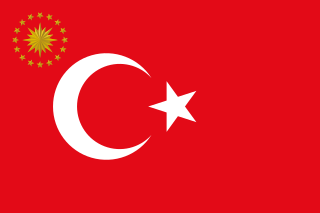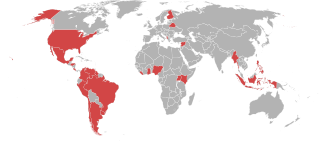
Tanzania, officially the United Republic of Tanzania, is a country in East Africa within the African Great Lakes region. It is bordered by Uganda to the northwest; Kenya to the northeast; the Indian Ocean to the east; Mozambique and Malawi to the south; Zambia to the southwest; and Rwanda, Burundi, and the Democratic Republic of the Congo to the west. Mount Kilimanjaro, Africa's highest mountain, is in northeastern Tanzania. According to the 2022 national census, Tanzania has a population of nearly 62 million, making it the most populous country located entirely south of the equator.
The politics of Tanzania takes place in a framework of a unitary presidential democratic republic, whereby the President of Tanzania is both head of state and head of government, and of a multi-party system. Executive power is exercised by the government. Legislative power is vested in both the government and parliament. The party system is dominated by the Chama Cha Mapinduzi. The Judiciary is independent of the executive and the legislature.

The Twenty-second Amendment to the United States Constitution limits the number of times a person can be elected to the office of President of the United States to two terms, and sets additional eligibility conditions for presidents who succeed to the unexpired terms of their predecessors. Congress approved the Twenty-second Amendment on March 21, 1947, and submitted it to the state legislatures for ratification. That process was completed on February 27, 1951, when the requisite 36 of the 48 states had ratified the amendment, and its provisions came into force on that date.

The president of Turkey, officially the president of the Republic of Türkiye, is the head of state and head of government of Turkey. The president directs the executive branch of the national government and is the commander-in-chief of the Turkish military. The president also heads the National Security Council.

The president of Gabon is the head of state of Gabon. A total of three people have served as president since the post was formed in 1960.

The president of the United Republic of Tanzania is the head of state and head of government of Tanzania.

The prime minister of Tanzania is the leader of government business in the National Assembly of the United Republic of Tanzania. The position is subordinated to the president, who is the actual head of government.

The vice president of the Philippines is the second-highest official in the executive branch of the Philippine government and is the first in the presidential line of succession. The vice president is directly elected by the citizens of the Philippines and is one of only two nationally elected executive officials, the other being the president.

The vice president of Brazil, officially the vice president of the Federative Republic of Brazil, or simply the vice president of the republic is the second-highest ranking government official in the executive branch of the Government of Brazil, preceded only by the president. The vice president's primary role is to replace the president in the event of their death, resignation, or impeachment, and to temporarily take over the presidential powers and duties while the president is abroad, or otherwise temporarily unable to carry out their duties. The vice president is elected jointly with the president as their running mate.

The vice president of the Republic of Liberia is the second-highest executive official in Liberia, and one of only two elected executive offices along with the president. The vice president is elected on the same ticket with the president to a six-year term. In the event of the death, resignation or removal of the president, the vice president ascends to the presidency, and holds the position for the remainder of their predecessor's term. The vice president also serves as the president of the Senate and may cast a vote in the event of a tie. The current vice president is Jeremiah Koung, serving under president Joseph Boakai. He began his term on January 22, 2024.

The National Assembly of Tanzania and the President of Tanzania of the United Republic make up the Parliament of Tanzania. The current Speaker of the National Assembly is Tulia Ackson, who presides over a unicameral assembly of 393 members.
This list of presidential elections in the Philippines includes election results of both presidential and vice presidential elections since 1899 with the candidates' political party and their corresponding percentage.

The Constitution of the United Republic of Tanzania, also known as the Permanent Constitution, was ratified in 16 March 1977. Before the current establishment, Tanzania has had three constitutions: the Independence Constitution (1961), the Republican Constitution (1962), and the Interim Constitution of the United Republic of Tanganyika and Zanzibar (1964).

The Chama Cha Mapinduzi is the dominant ruling party in Tanzania and the second longest-ruling party in Africa, only after the True Whig Party of Liberia. It was formed in 1977, following the merger of the Tanganyika African National Union (TANU) and the Afro-Shirazi Party (ASP), which were the sole operating parties in mainland Tanzania and the semi-autonomous islands of Zanzibar, respectively.

Samia Suluhu Hassan is a Tanzanian politician who has served as president of Tanzania since 19 March 2021. She is the first woman to serve in the position. She previously served as vice-president of Tanzania from 2015 to 2021, from which she ascended to the presidency following the death of her predecessor, John Magufuli.

The vice-president of Ghana is the second-highest officer in the Government of Ghana. The vice-president, together with the President of Ghana, is directly elected by the people through popular vote to serve a four-year term in office. The vice-president is the first person in the presidential line of succession, and would ascend to the presidency upon the death, resignation, or removal of the president. The current vice-president is Mahamudu Bawumia, who took office on 7 January 2017, under President Nana Akufo-Addo.

General elections were held in Ghana on 7 December 2016 to elect a President and Members of Parliament. They had originally been scheduled for 7 November 2016, but the date was later rejected by Parliament. Former foreign minister Nana Akufo-Addo of the opposition New Patriotic Party was elected President on his third attempt, defeating incumbent President John Mahama of the National Democratic Congress.

A natural-born-citizen clause is a provision in some constitutions that certain officers, usually the head of state, must be "natural-born" citizens of that state, but there is no universally accepted meaning for the term natural-born. The constitutions of a number of countries contain such a clause but may define or interpret the term natural-born citizen differently. Many countries specify citizenship since birth as a requirement to hold certain offices. This is often described using the natural born phraseology and sometimes further qualified as requiring physical birth within the country's territory and/or requiring that one or both natural parents be a citizen of the country at the time of birth.






























